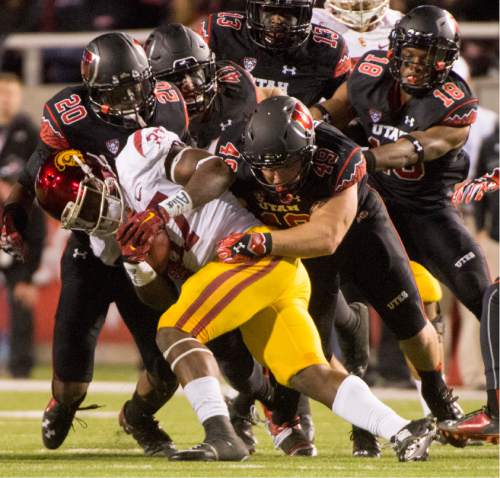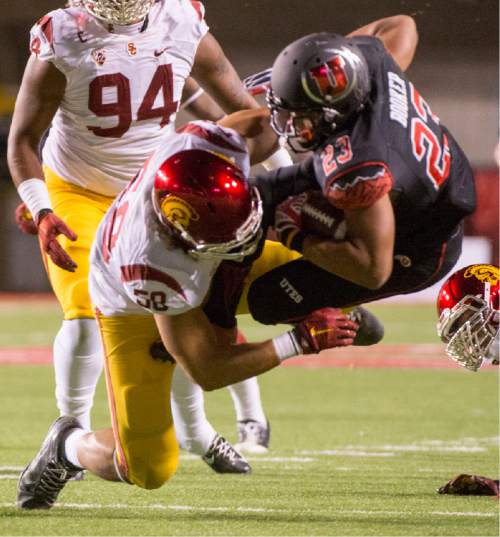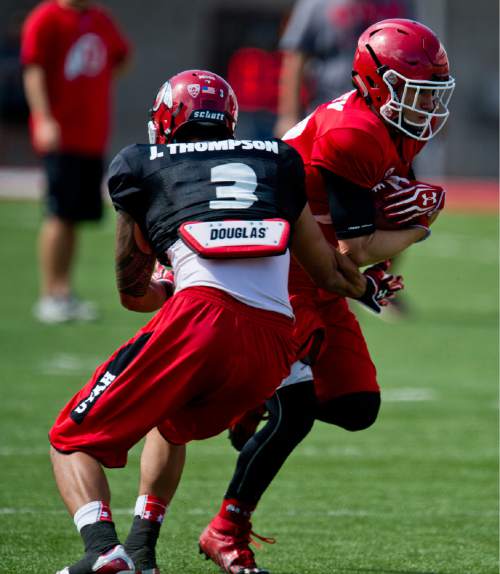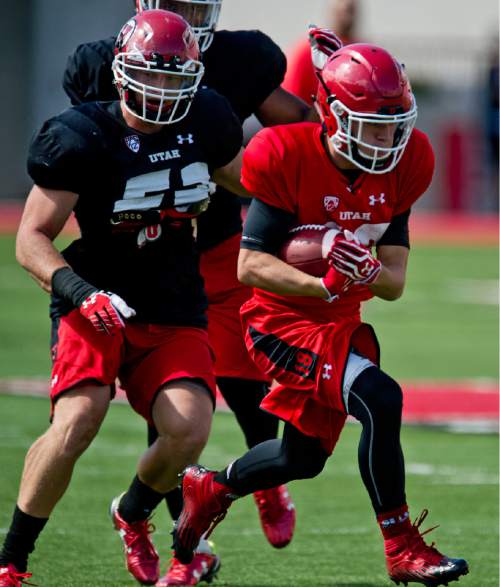This is an archived article that was published on sltrib.com in 2015, and information in the article may be outdated. It is provided only for personal research purposes and may not be reprinted.
In 25 years of doing this stuff every day, anyone would have some mistakes, misjudgments, omissions and just plain misses.
My Tribune anniversary this week forces me to look back and, as with anyone involved in sports, I tend to dwell on the ones I'd like to do over. Like declaring in the summer of 2010 that BYU's bold move into football independence gave the Cougars "a draw" with Utah's Pac-12 invitation.
Wow. Five years later, how silly do those words appear?
The only thing resembling a tie in those two transitions is how much I underestimated the value of Utah's Pac-12 membership and overestimated what independence would do for BYU. Yeah, that's a draw.
In my defense, some things have changed in five years that alter the outlook of independence. I can't claim to have been overwhelmed by BYU's announcement, because the event was rather subdued, compared with Utah's celebration featuring balloons and roses two months earlier. The news of BYU's six-game series with Notre Dame and eight-year contract with ESPN did impress me more than it should have, though.
That's not all my fault. Notre Dame has fulfilled only one-third of that deal, with two home games, and nothing suggests the others ever will be played. That's significant. Imagine this year's BYU home schedule including Notre Dame, No. 4 in Sports Illustrated's preseason rankings. As for ESPN, I overreacted to the thought of the network televising BYU home games, picturing the Cougars playing whenever they wanted to and having ESPN cater to them. That's apparently not how it works, judging by those 8:15 p.m. games in Provo.
I still would endorse BYU's move from the Mountain West, and applaud athletic director Tom Holmoe's scheduling work. ESPN also has brokered some good matchups. The transition has asked a lot of BYU fans, however, as they deal with unfavorable kickoff times and a generally unattractive home schedule — until later this decade. And college football's landscape has changed, affecting an independent program. Utah State, for example, opens the 2015 season with much more reasonable access to a New Year's 6 bowl game than BYU.
The reasons that I undervalued Utah's move revolve around the state of Pac-12 football. In 2010, absolutely no one would have equated the Pac-12 South to the SEC West, but that's a valid conversation now. When the Utes finished fifth in their division as a Top 25 team last year, that made quite a statement about the South's level of competition. Even without winning any national championships lately, the Pac-12 has built a brand that benefits Utah.
"I love the competition, and just being in that atmosphere," said Britain Covey, a Ute freshman receiver.
Covey grew up in Provo in a family with strong emotional and geographical ties to BYU, and now he's at Utah. He's not the prototypical recruit, at 5-foot-8, but his background symbolizes some kind of alternate universe these days.
"When you get older," he said, "you start to gain a better perspective of the reality of things. Like, 'Why did I hate Utah all these years?' "
The attraction of Utah is "just the program," Covey said. "It's on the rise. Obviously, the facilities are unbelievable."
Everything about the Utes has the look and feel of a genuine Pac-12 operation. BYU also is a big-time program, while lacking an affiliation to prove it. So what can the Cougars do?
Keep competing, is the answer. BYU is providing cost of attendance help to athletes, as Power 5 schools are doing. Coincidentally or not, with Utah appearing on the Pac-12 weekly documentary "The Drive" on Wednesdays this season, the Cougars are launching "Inside BYU Football" on BYUtv on Tuesdays. That's a good innovation.
BYU is scheduling ambitiously, and now the Cougars need to win a bunch of those games — notably, this September. They must keep their fans engaged until the home schedule improves. The Cougars really have to hope that College Football Playoff exclusion forces the Big 12 to expand.
BYU also needs to beat Utah, whenever that opportunity exists. I was naïve about that element of BYU's and Utah's divergence, figuring the in-state series would continue forever. The rivalry is not merely a media creation. Ask longtime Utahns such as Ron McBride and Frank Layden what the game means to this state, and they'll tell you that the Utes shouldn't believe they've outgrown it.
Yet there's no question that Utah is in another realm than it was before, and BYU is in an awkward stage. Five years later, that's the conclusion I would draw.
Twitter: @tribkurt









